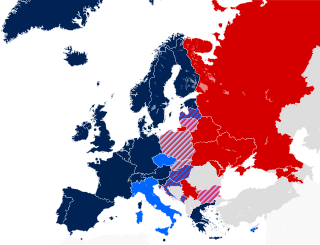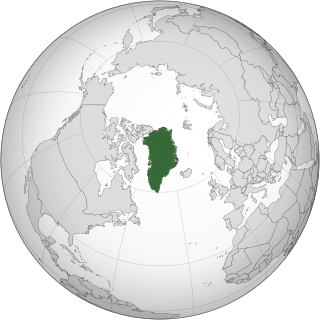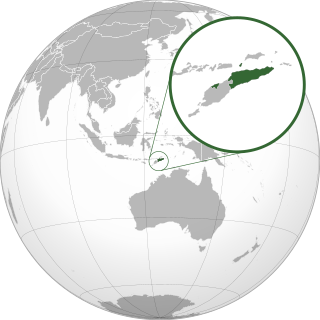
The national flag of Montenegro has a red field with gold border and the coat of arms of Montenegro in its center. It was officially adopted on 13 July 2004, when the then Republic of Montenegro was a constituent of the State Union of Serbia and Montenegro, and its precise specification was standardized on 16 September 2004. The flag was retained after Montenegrin independence from Serbia in 2006, and mandated by Article 4 of the Constitution of Montenegro adopted in 2007.

Rights affecting lesbian, gay, bisexual, and transgender (LGBT) people vary greatly by country or jurisdiction—encompassing everything from the legal recognition of same-sex marriage to the death penalty for homosexuality.

Croatia recognizes life partnerships for same-sex couples through the Life Partnership Act, making same-sex couples equal to married couples in almost all of its aspects. The Act also recognizes and defines unregistered same-sex relationships as informal life partners, thus making them equal to registered life partnerships after they have been cohabiting for a minimum of 3 years. Croatia first recognized same-sex couples in 2003 through a law on unregistered same-sex unions, which was later replaced by the Life Partnership Act. The Croatian Parliament passed the new law on 15 July 2014, taking effect in two stages. Following a 2013 referendum, the Constitution of Croatia has limited marriage to opposite-sex couples.
Same-sex marriage has been legal in Slovenia since 9 July 2022 in accordance with a ruling from the Constitutional Court of Slovenia. The court ruled that the ban on same-sex marriages violated the Constitution of Slovenia and gave the Parliament six months to amend the law to align with the ruling, although the decision took effect immediately after publication. The National Assembly passed legislation to align with the court ruling on 4 October 2022, which was vetoed by the National Council one week later, but the veto was then overridden by the National Assembly on 18 October 2022.

Lesbian, gay, bisexual, and transgender (LGBT) rights in Croatia have expanded since the turn of the 21st century, especially in the 2010s and 2020s. However, LGBT people still face some legal challenges not experienced by non-LGBT residents. The status of same-sex relationships was first formally recognized in 2003 under a law dealing with unregistered cohabitations. As a result of a 2013 referendum, the Constitution of Croatia defines marriage solely as a union between a woman and man, effectively prohibiting same-sex marriage. Since the introduction of the Life Partnership Act in 2014, same-sex couples have effectively enjoyed rights equal to heterosexual married couples in almost all of its aspects. In 2022, a final court judgement allowed same-sex adoption under the same conditions as for mixed-sex couples. Same-sex couples in Croatia can also apply for foster care since 2020. Croatian law forbids all discrimination on the grounds of sexual orientation, gender identity, and gender expression in all civil and state matters; any such identity is considered a private matter and such information gathering for any purpose is forbidden as well.

Lesbian, gay, bisexual, and transgender (LGBT) people in Slovakia face a multitude of legal and social challenges not experienced by non-LGBT residents.

LGBT people in Bulgaria face legal challenges not experienced by non-LGBT residents. Both male and female same-sex relationships are legal in Bulgaria, but same-sex couples and households headed by same-sex couples are not eligible for the same legal protections available to opposite-sex couples. Discrimination on the basis of sexual orientation has been banned since 2004, with discrimination based on "gender change" being outlawed since 2015. In July 2019, a Bulgarian court recognized a same-sex marriage performed in France in a landmark ruling. For 2020, Bulgaria was ranked 37 of 49 European countries for LGBT rights protection by ILGA-Europe. Like most countries in Central and Eastern Europe, post-Communist Bulgaria holds socially conservative attitudes when it comes to such matters as homosexuality and transgender people.

Lesbian, gay, bisexual, and transgender (LGBT) people in Serbia face legal challenges not experienced by non-LGBT residents. Both male and female same-sex sexual activity are legal in Serbia, and discrimination on the basis of sexual orientation is banned in areas such as employment, education, media, and the provision of goods and services, amongst others. Nevertheless, households headed by same-sex couples are not eligible for the same legal protections available to opposite-sex couples.

Lesbian, gay, bisexual, and transgender (LGBT) persons in Bosnia and Herzegovina may face legal challenges not experienced by non-LGBT residents. Both male and female same-sex sexual activity are legal in Bosnia and Herzegovina. However, households headed by same-sex couples are not eligible for the same legal protections available to opposite-sex couples.

Lesbian, gay, bisexual, and transgender (LGBT) people in South Africa have the same legal rights as non-LGBT people. South Africa has a complex and diverse history regarding the human rights of LGBT people. The legal and social status of between 400,000–over 2 million lesbian, gay, bisexual, transgender and intersex South Africans has been influenced by a combination of traditional South African morals, colonialism, and the lingering effects of apartheid and the human rights movement that contributed to its abolition.

Lesbian, gay, bisexual, and transgender (LGBT) people in Moldova face legal and social challenges and discrimination not experienced by non-LGBT residents. Households headed by same-sex couples are not eligible for the same rights and benefits as households headed by opposite-sex couples. Same-sex unions are not recognized in the country, so consequently same-sex couples have little to no legal protection. Nevertheless, Moldova bans discrimination based on sexual orientation in the workplace, and same-sex sexual activity has been legal since 1995.

Lesbian, gay, bisexual, and transgender (LGBT) rights in Portugal improved substantially in the 21st century, and are now among the most advanced in the world. After a long period of oppression during the Estado Novo, Portuguese society has become increasingly accepting of homosexuality, which was decriminalized in 1982, eight years after the Carnation Revolution. Portugal has wide-ranging anti-discrimination laws and is one of the few countries in the world to contain a ban on discrimination based on sexual orientation in its Constitution. On 5 June 2010, the state became the eighth in the world to recognize same-sex marriage. On 1 March 2011, a gender identity law, said to be one of the most advanced in the world, was passed to simplify the process of sex and name change for transgender people. Same-sex couples have been permitted to adopt since 1 March 2016.

Lesbian, gay, bisexual, and transgender (LGBT) rights in Slovenia have significantly evolved over time, and are considered among the most advanced in easterly Europe. Slovenia was the first post-communist country to have legalised same-sex marriage, and anti-discrimination laws regarding sexual orientation and gender identity have existed nationwide since 2016.

Lesbian, gay, bisexual, and transgender (LGBT) rights are widely diverse in Europe per country. Twenty of the 35 countries that have legalised same-sex marriage worldwide are situated in Europe. A further eleven European countries have legalised civil unions or other forms of more limited recognition for same-sex couples.

Lesbian, gay, bisexual, and transgender (LGBT) rights in Kosovo have improved in recent years, most notably with the adoption of the new Constitution, banning discrimination based on sexual orientation. Kosovo remains one of the few Muslim-majority countries where LGBT pride parades are held annually.

Lesbian, gay, bisexual, and transgender (LGBT) rights in Greenland are some of the most extensive in the Americas and the world, relatively similar to those in Denmark proper in Europe. Same-sex sexual activity is legal, with an equal age of consent, and there are some anti-discrimination laws protecting LGBT people. Same-sex couples had access to registered partnerships, which provided them with nearly all of the rights provided to married opposite-sex couples, from 1996 to 2016. On 1 April 2016, a law repealing the registered partnership act and allowing for same-sex marriages to be performed came into effect.

Lesbian, gay, bisexual, and transgender (LGBT) rights in Scotland are generally in line with the rest of the United Kingdom, which have evolved extensively over time and are now regarded as some of the most progressive in Europe. In both 2015 and 2016, Scotland was recognised as the "best country in Europe for LGBTI legal equality".

Lesbian, gay, bisexual, and transgender (LGBT) people in East Timor face legal challenges not experienced by non-LGBT residents. Both male and female same-sex sexual activity are legal in East Timor, but same-sex couples and households headed by same-sex couples are not eligible for the same legal protections available to opposite-sex married couples.
Montenegro has recognised same-sex unions since 15 July 2021. In July 2020, the Parliament of Montenegro passed a bill, by 42 votes to 5, to recognise life partnerships for same-sex couples offering several, but not all, of the rights and benefits of marriage. The bill was signed into law on 3 July 2020 by President Milo Đukanović and took effect on 15 July 2021.

Montenegro Pride is the national LGBTIQ pride march in the city of Podgorica, the capital of Montenegro, which first took place for the first time in 2013. Since then Montenegro Pride has become an annual event. It is self-identified as an LGBTIQ pride rally.

![Laws regarding same-sex partnerships in Europe1
.mw-parser-output .legend{page-break-inside:avoid;break-inside:avoid-column}.mw-parser-output .legend-color{display:inline-block;min-width:1.25em;height:1.25em;line-height:1.25;margin:1px 0;text-align:center;border:1px solid black;background-color:transparent;color:black}.mw-parser-output .legend-text{}
Marriage
Civil union
Limited domestic recognition (cohabitation)
Limited foreign recognition (residency rights)
Unrecognized
Constitution limits marriage to opposite-sex couples
1 May include recent laws or court decisions that have not yet entered into effect.
.mw-parser-output .hlist dl,.mw-parser-output .hlist ol,.mw-parser-output .hlist ul{margin:0;padding:0}.mw-parser-output .hlist dd,.mw-parser-output .hlist dt,.mw-parser-output .hlist li{margin:0;display:inline}.mw-parser-output .hlist.inline,.mw-parser-output .hlist.inline dl,.mw-parser-output .hlist.inline ol,.mw-parser-output .hlist.inline ul,.mw-parser-output .hlist dl dl,.mw-parser-output .hlist dl ol,.mw-parser-output .hlist dl ul,.mw-parser-output .hlist ol dl,.mw-parser-output .hlist ol ol,.mw-parser-output .hlist ol ul,.mw-parser-output .hlist ul dl,.mw-parser-output .hlist ul ol,.mw-parser-output .hlist ul ul{display:inline}.mw-parser-output .hlist .mw-empty-li{display:none}.mw-parser-output .hlist dt::after{content:": "}.mw-parser-output .hlist dd::after,.mw-parser-output .hlist li::after{content:" * ";font-weight:bold}.mw-parser-output .hlist dd:last-child::after,.mw-parser-output .hlist dt:last-child::after,.mw-parser-output .hlist li:last-child::after{content:none}.mw-parser-output .hlist dd dd:first-child::before,.mw-parser-output .hlist dd dt:first-child::before,.mw-parser-output .hlist dd li:first-child::before,.mw-parser-output .hlist dt dd:first-child::before,.mw-parser-output .hlist dt dt:first-child::before,.mw-parser-output .hlist dt li:first-child::before,.mw-parser-output .hlist li dd:first-child::before,.mw-parser-output .hlist li dt:first-child::before,.mw-parser-output .hlist li li:first-child::before{content:" (";font-weight:normal}.mw-parser-output .hlist dd dd:last-child::after,.mw-parser-output .hlist dd dt:last-child::after,.mw-parser-output .hlist dd li:last-child::after,.mw-parser-output .hlist dt dd:last-child::after,.mw-parser-output .hlist dt dt:last-child::after,.mw-parser-output .hlist dt li:last-child::after,.mw-parser-output .hlist li dd:last-child::after,.mw-parser-output .hlist li dt:last-child::after,.mw-parser-output .hlist li li:last-child::after{content:")";font-weight:normal}.mw-parser-output .hlist ol{counter-reset:listitem}.mw-parser-output .hlist ol>li{counter-increment:listitem}.mw-parser-output .hlist ol>li::before{content:" "counter(listitem)"\a0 "}.mw-parser-output .hlist dd ol>li:first-child::before,.mw-parser-output .hlist dt ol>li:first-child::before,.mw-parser-output .hlist li ol>li:first-child::before{content:" ("counter(listitem)"\a0 "}
.mw-parser-output .navbar{display:inline;font-size:88%;font-weight:normal}.mw-parser-output .navbar-collapse{float:left;text-align:left}.mw-parser-output .navbar-boxtext{word-spacing:0}.mw-parser-output .navbar ul{display:inline-block;white-space:nowrap;line-height:inherit}.mw-parser-output .navbar-brackets::before{margin-right:-0.125em;content:"[ "}.mw-parser-output .navbar-brackets::after{margin-left:-0.125em;content:" ]"}.mw-parser-output .navbar li{word-spacing:-0.125em}.mw-parser-output .navbar a>span,.mw-parser-output .navbar a>abbr{text-decoration:inherit}.mw-parser-output .navbar-mini abbr{font-variant:small-caps;border-bottom:none;text-decoration:none;cursor:inherit}.mw-parser-output .navbar-ct-full{font-size:114%;margin:0 7em}.mw-parser-output .navbar-ct-mini{font-size:114%;margin:0 4em}
v
t
e Same-sex marriage map Europe detailed.svg](http://upload.wikimedia.org/wikipedia/commons/thumb/2/25/Same-sex_marriage_map_Europe_detailed.svg/280px-Same-sex_marriage_map_Europe_detailed.svg.png)


















